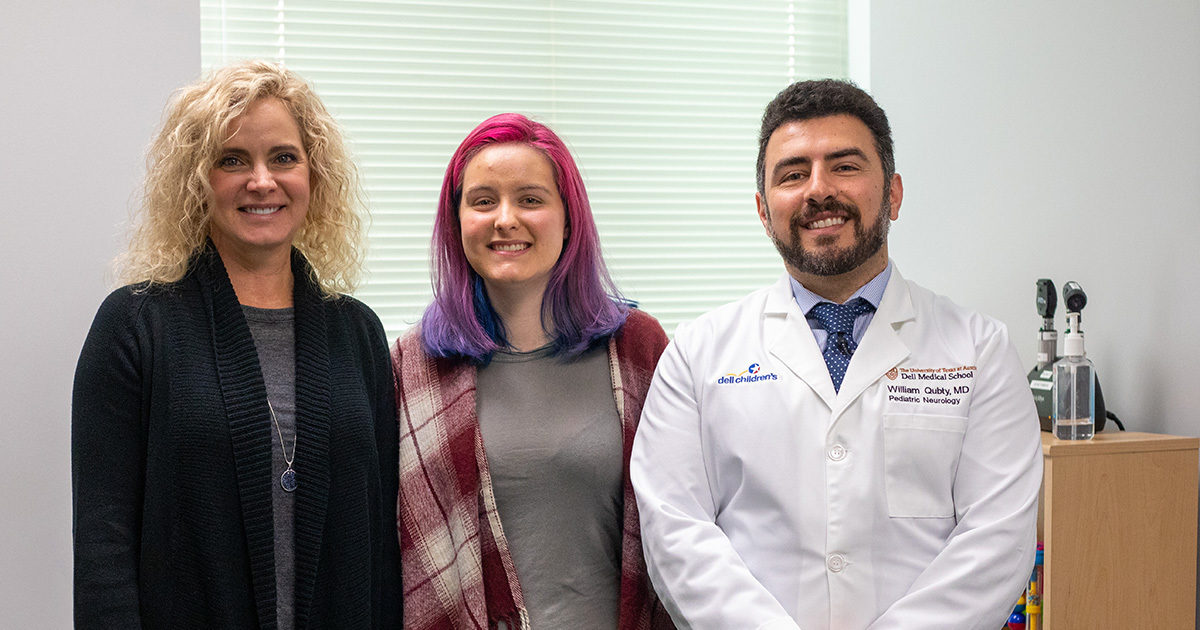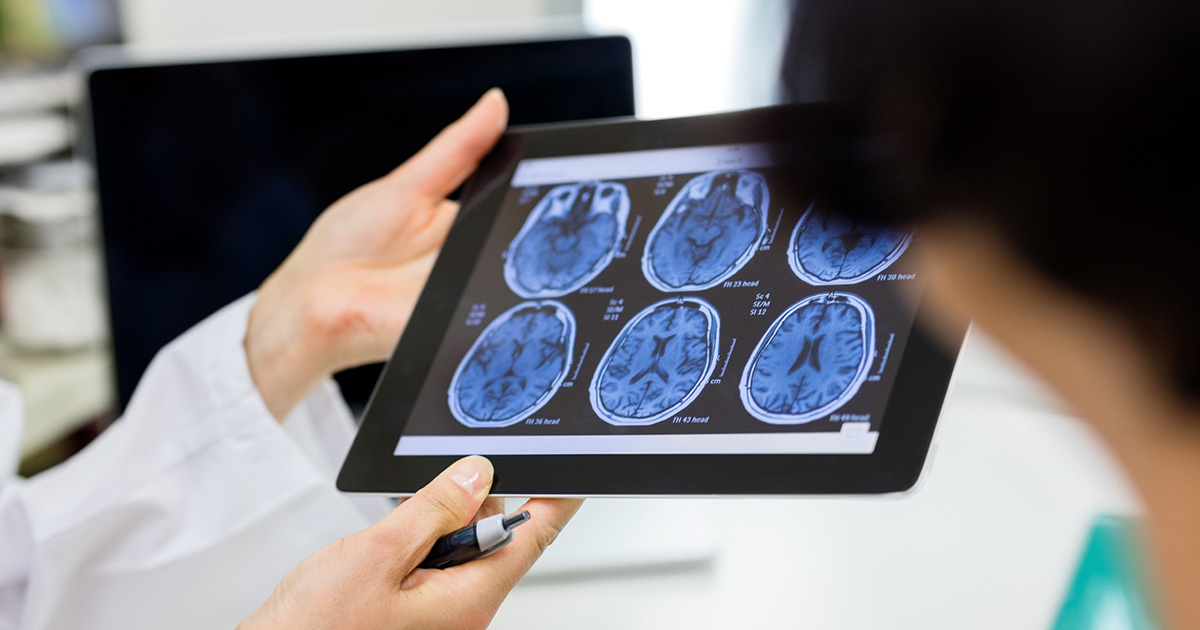After Ten Years of Chronic Migraines, Kaitlin Finally Gets Her Life Back
A new chronic migraine treatment helps one patient return to living her life without major setbacks
Reviewed by: Kaitlin Lunt and William Qubty, MD
Written by: Lauryn Feil

Kaitlin Lunt is a 22-year-old Austin resident who has suffered from chronic migraines for ten years. Her first migraine, she recalls, occurred in November 2009 when she was just 12 years old. As a child, Kaitlin had a passion for swimming. She swam competitively and had dreams of going to college for competitive swimming and even competing in the Olympics. But when one migraine turned into daily, weekly, monthly migraines, Kaitlin was forced to walk away from the pool, and her entire life changed.
Years of Frustration
Migraines are a complicated neurological condition that is frequently characterized by intense, debilitating headaches. Other accompanying symptoms include nausea, vomiting, dizziness, numbness or tingling, difficulty speaking, sleep disturbances, depression, and fatigue as well as sensitivity to touch, sound, light, and smells. While children and adolescents generally experience fewer and shorter migraine attacks than adult sufferers, childhood migraines can be just as disabling and can seriously affect a child’s quality of life.
About 10% of school-aged children suffer from migraines and up to 28% of adolescents between the ages of 15-19 are affected. Half of all migraine sufferers have their first attack before the age of 12. In addition to the migraine disabilities itself, kids and teens may develop preemptive anxiety, causing them to worry that at any time, a migraine could disrupt their life. Kaitlin was diagnosed with chronic migraine (CM), which occurs when a child has 15 or more headaches per month that last for more than four hours, for more than three months. Like Kaitlin, many teenagers with CM report daily headaches. CM is challenging to treat and significantly impairs quality of life.
In a conversation with Kaitlin and her mom, Kaitlin says they tried everything to treat her CM. From various migraine medications, to massage therapy, to trigger point injections, and more, nothing seemed to give Kaitlin relief. “Having a constant headache, five days a week is really tough,” says Kaitlin, “You can’t do anything. I couldn’t go to school, I had to ask teachers for extensions, I had to quit swimming, and everything began to revolve around whether or not I was going to get a headache. It affected my entire life.”
In addition to CM, Kaitlin also has epilepsy. Headaches, especially migraines, have long been associated with epilepsy, based on common clinical features, epidemiology, and genetic factors, so treatment methods for both conditions can be similar. Because of her epilepsy, Kaitlin has been a patient of the Dell Children’s Comprehensive Pediatric Epilepsy Center at Dell Children’s within UT Health Austin Pediatric Neurosciences at Dell Children’s, a clinical partnership between UT Health Austin and Dell Children’s Medical Center, since she was a child. Her seizures have been under control for years, and she has been working with the team and other specialists to find an effective treatment for her CM.
Hope at Last
As Kaitlin and her mom indicated, they tried just about everything. Kaitlin maintained an open mindset about possible treatments, but she wasn’t feeling very hopeful that they would find anything effective. They finally caught a break when child neurologist and headache specialist William Qubty, MD, was recruited to launch the Dell Children’s Pediatric Headache Center within UT Health Austin Pediatric Neurosciences at Dell Children’s. Kaitlin and her mom initially met with Dr. Qubty in May 2019, around the time when a new drug, known as Aimovig®, was gaining credibility as an effective CM treatment.
“In Kaitlin’s case, she had trialed many different medications, each coming with their own specific side-effects and each also having the potential to interact with her anti-seizure medications,” says Dr. Qubty. “So, when we talked about it, I suggested a new treatment called Aimovig® that is designed to treat the root cause of migraines instead of borrowing from other fields of medicine.”
Aimovig® is an injection that can be conveniently administered at home once per month. It contains the drug erenumab, which is a monoclonal antibody that works by blocking the activity of specific proteins in the body. “We know the cause of migraines is the pain chemical CGPR, and Aimovig® specifically targets that pain chemical. There has been no risk shown to people with epilepsy, and it’s also quite well-tolerated, which is consistent with the research we have on it so far,” says Dr. Qubty.
The drug helps reduce migraine frequency, intensity, and duration. Kaitlin explains how surprised she was when the treatment actually worked for her. “I’ve just been dealing with this for so long, and I wasn’t expecting anything. It’s kind of crazy, I can actually do my schoolwork, and I’m not constantly worried about getting a migraine,” she says.
Aimovig® is one of just a few approved treatments for CM. Another treatment includes a series of Botox injections where patients receive 31 Botox injections to the face, head, and neck every three months. “Aimovig® is better tolerated than the frequent Botox, and I think it’s going to be a very valuable option for many chronic migraine sufferers,” says Dr. Qubty.
Back on Track
Kaitlin has returned to her college coursework and is hoping to finish up soon now that she’s able to move forward without any major setbacks. She’s studying computer science and is looking forward to getting a job after she graduates. It’s also clear that Kaitlin has a passion for helping inform others who may be suffering from CM, especially children and adolescents. “My entire teenage years were totally changed by migraines. You can’t really be a kid. I had to stop swimming, but if I can help other kids get better and be that Olympic swimmer, then I’m going to broadcast it!” she says.
For more information or to schedule an appointment with the Dell Children’s Pediatric Headache Center, call 1-512-628-1855 or visit here.
For more information or to schedule an appointment with the Dell Children’s Comprehensive Pediatric Epilepsy Center, call 1-512-628-1855 or visit here.
